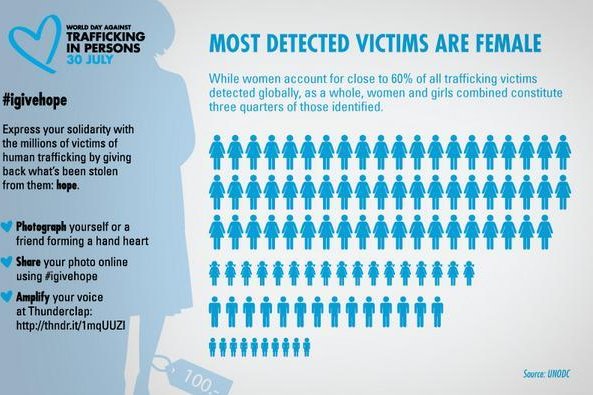A poster commemorating the first World Day Against Trafficking In Persons on July 30, 2014. (Twitter/UNODC)
NEW YORK, July 30 (UPI) -- In 2013, the United Nations General Assembly adopted a resolution to designate July 30 as World Day Against Trafficking in Persons in order to "raise awareness of the situation of victims of human trafficking and for the promotion and protection of their rights."
The day is not only about awareness, says U.N. Secretary-General Ban Ki-moon. It is also about action.
"This first World Day against Trafficking in Persons is a call to action to end this crime and give hope to the victims, who often live unrecognized among us."
U.N. Office on Drugs and Crime Executive Director Yury Fedotov acknowledged that with an estimated 2.5 million people living in modern-day slavery and someone trafficked each day, "we are still far from winning this fight."
In 2003, more than half of the world's countries did not have laws against human trafficking. Today, more than 90 percent do. Those laws, however, are not always enforced.
"This is of great concern," says Fedotov, "because convictions not only ensure that the offenders have to answer for their crimes. They send an important signal to criminals -- for whom trafficking is a low-risk, high-profit activity -- that this violation will not be tolerated."
Ban Ki-moon agrees that enforcement is key. In his statement on world trafficking, he also urged a dual approach: targeting the traffickers as well as the root causes.
"To stop the traffickers, we must sever funding pipelines and seize assets. I urge all countries to ratify and fully implement the United Nations Convention against Transnational Organized Crime and its Protocol on Trafficking in Persons.
Enforcement, cross-border cooperation and information-sharing can all be effective, but ending human trafficking also means tackling the root causes. Extreme poverty, entrenched inequality and a lack of education and opportunity create the vulnerabilities that traffickers exploit. Ultimately, the best protection is to accelerate development for all."
The U.N. promoted awareness of World Day Against Trafficking in Persons through a hashtag campaign of #givehope "to symbolically help give back this precious item." Participants are encouraged to take a photo of themselves or friends forming a heart with their hands along with the hash-tag #givehope, and post it social media and the Blue Heart Facebook Page.















